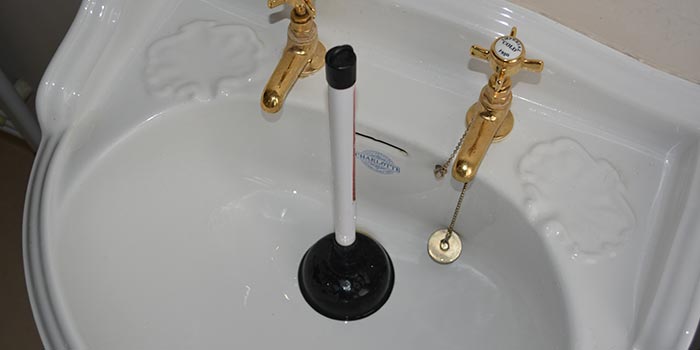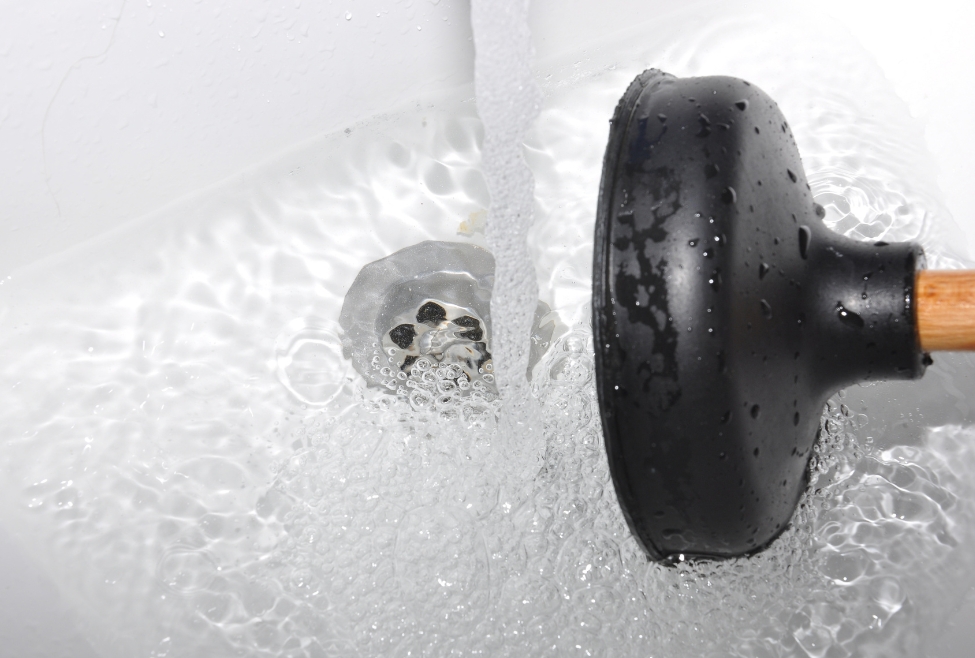Practical Techniques For Addressing A Slow-Draining Sink
Practical Techniques For Addressing A Slow-Draining Sink
Blog Article
What are your thoughts with regards to Three Common Ways to Fix a Slow Drain?

Intro
We have actually all been there: You're cleaning your teeth or washing your hands, and you observe the water merging in the sink. As opposed to quickly swirling away, it sticks around, transforming your once-refreshing morning regimen into a small overload scene. A slow-draining sink isn't simply annoying; it's often a sign of bigger pipes issues prowling below the surface. The bright side is that many slow-draining sinks can be repaired with a little expertise, a few basic tools, and some perseverance. All set to tackle this task head-on? Allow's roll up our sleeves and dive right in.
Comprehending the Root Causes Of a Slow-Draining Sink
Prior to you begin poking around in your pipes, it helps to know what may be creating the slowdown. Comprehending the root cause makes it less complicated to choose the best repair.
Usual Culprits Behind Slow Drainage
So, what's clogging things up? Usually, it's a blend of day-to-day particles-- think hair, soap residue, tooth paste deposit, and remaining food bits. Gradually, these little bits build up and cling to the pipe walls, gradually tightening the flow and making it harder for water to go through. Sometimes, mineral deposits from hard water can additionally contribute to the gunk, developing the best storm for stubborn obstructions.
When is it Time to Act?
If you notice the water draining pipes slower than normal, it's a great idea to interfere faster rather than later on. Waiting too long can result in finish obstructions, undesirable smells, or perhaps pipe damages. If the water takes more than a few secs to remove after shutting off the tap, consider it a warning and prepare to place on your do it yourself hat.
Devices and Products You'll Require
The right devices make all the distinction. Fortunately, you will not require a totally equipped plumbing professional's van to get the job done.
Vital Tools for DIY Repairs
A bettor is your best starting point. A tiny, sink-sized bettor produces suction that can remove small obstructions. For more persistent clogs, a drain serpent (sometimes called a plumber's auger) functions wonders. A pair of handwear covers, a flashlight, and possibly a pair of safety goggles are likewise useful.
Advised Cleaning Solutions
Mild dish soap and hot water can help break down oily build-up. A mixture of baking soft drink and vinegar is a tried and true natural remedy, and chemical cleansers supply an even more environmentally friendly strategy. Maintain chemical drain cleaners as a last resource, as they can be rough on your pipes.
Safety And Security First: Safety Measures and Prep work
Prior to you launch into unclogging setting, think of safety. You're handling potentially dirty water and debris, so slip on a pair of gloves. If you're making use of chemical cleaners, make certain the room is well-ventilated and adhere to the guidelines on the tag.
Protective Equipment and Work Area Setup
Put down some old towels or cloths around the sink location to capture sprinkles. Remove any kind of things that could get in your method, like soap dispensers or tooth brush owners. Make certain you have great illumination-- grab a flashlight if required.
Step-by-Step Overview to Taking Care Of a Slow-Draining Sink
Now, let's get involved in the nitty-gritty. This step-by-step process will certainly guide you with basic strategies to restore your sink's water drainage.
Step 1: Eliminate and Clean the Stopper
Usually, the stopper (that small plug you push down to obstruct water) is the first perpetrator. Remove it carefully and clean off any hair or substance entraped around its base. Wash it extensively prior to putting it back in position.
Action 2: Make Use Of a Plunger to Dislodge Debris
Got that bettor all set? Position it over the drainpipe and give it a few company pumps. The concept is to create suction that can loosen any kind of obstruction. If you see little bits of particles floating up, you get on the best track.
Action 3: Try a Drain Snake or Cord Wall Mount
If the bettor doesn't suffice, it's time to draw out the drain snake. Carefully feed it into the drain and twist as you go. You might really feel some resistance-- that's likely the obstruction. Maintain turning and pulling till you remove the obstruction. If you don't have a drainpipe snake, a straightened out cable hanger can work in a pinch.
Step 4: Apply a DIY Drainpipe Cleanser
An all-natural cleaner made from cooking soda and vinegar can break down residual crud. Put half a mug of cooking soft drink right into the drainpipe, followed by half a cup of vinegar. Allow it fizz for about 15 mins, after that flush with hot water. This chain reaction commonly does marvels for minor clogs.
Tip 5: Reassemble and Test the Sink
Put whatever back together and run the faucet. Does the water currently swirl away at a commendable rate? If yes, give on your own a pat on the back. If not, don't misery-- there are still a couple of more dress up your sleeve.
Alternate Techniques for Stubborn Clogs
Not all clogs are produced equal. If your sink still rejects to comply, think about these different remedies.
Baking Soda and Vinegar Technique
We already touched on this, yet it's worth noting once again. This mild, green approach is more secure than chemical cleaners and typically quite efficient.
Enzymatic Drainpipe Cleansers
Enzyme-based cleansers use natural bacteria to digest organic matter. They're an exceptional option if you're aiming to stay clear of rough chemicals. Simply remember, they might take a bit longer to function their magic.
Chemical Drain Cleaners: Advantages And Disadvantages
Chemical cleaners can blow up with tough obstructions quick, however they're not without disadvantages. They can generate warm and fumes, damage pipes if utilized excessively, and position environmental risks. Utilize them sparingly, and always follow the directions meticulously.
Safety Nets to Maintain Your Sink Flowing
Prevention is the most effective remedy. By adopting a couple of simple routines, you can maintain your sink from slowing down to begin with.
Regular Cleaning Routines
Wipe down the sink container and component location frequently. Get rid of hair or food particles prior to they have a possibility to wash down the drainpipe.
Preventing Unsafe Compounds Down the Drain
Think twice before unloading coffee premises, oil, or fibrous veggie scraps down the sink. These offenders cling to pipeline walls, creating clogs with time.
Regular Upkeep Checks
Arrange a quick regular monthly examination. Run hot water through the sink for a couple of minutes, taking note of the flow. If it appears sluggish, act fast prior to it comes to be a full-blown blockage.
When to Call an Expert Plumbing Professional
Sometimes, regardless of just how difficult you try, that obstruct just will not move. That's when it's time to bring in the pros.
Signs That Show a Much More Major Concern
If your sink drains gradually in spite of numerous efforts, or if you see water supporting in various other fixtures (like your shower or toilet), you might have a much more significant plumbing problem prowling deeper in the system.
Balancing DIY Initiatives with Specialist Aid
While do it yourself can save you cash and provide a sense of achievement, there's no pity in calling a professional. An expert plumbing professional can examine your whole pipes setup, making certain there's no underlying damage or lasting trouble that can cost you more down the road.
Contrasting Expenses and Long-Term Solutions
Prior to deciding, consider the big picture. An economical, quick fix might fix the issue momentarily, however purchasing an extra permanent remedy might save you money and stress in the future.
Evaluating the Expenses of Do It Yourself vs. Specialist Solutions
DIY fixes often set you back little more than the cost of a plunger or a bottle of cooking soda. Expert services, on the other hand, included a cost but might stop repetitive problems and pricey repair services later.
Investing in High Quality Fixtures and Upgrades
If your sink's style contributes to regular blockages, it might be worth upgrading to higher-quality fixtures or modifying the pipes design. Consider this a financial investment in your house's performance and comfort.
Final thought
A slow-draining sink can feel like a small irritation, yet it's commonly an indication that your pipes needs a little tender loving care. By understanding the source, employing the right tools and strategies, and committing to simple safety nets, you can keep your sink moving openly. And when all else stops working, never ever be reluctant to hire an expert-- your home's pipes is worth the investment in care and maintenance.
Three Common Ways to Fix a Slow Drain
Baking Soda Method
Boil a full pot of water. Measure out cup of baking soda and pour it down the drain. Then take cup of the magical cleansing substance known as white vinegar and drop that down there too. Allow the mixture to fizz in the drain for five minutes as the vinegar and baking soda combine. Now dump in that whole pot of boiling water. This combination of cleaning substances should clear out anything that is causing your sink to drain slowly. If it doesn t...
Zip-It
If the baking soda method doesn t clear out your drain, it may be because a significant amount of hair and/or other debris has collected there and you need to remove it. Purchase a Zip-It tool at any home improvement or hardware store and insert it into your drain. It will catch any collected hair or debris that s blocking the flow of water. Pull it out. If it s got a big clump of hair, etc. on the end, you ve probably got your culprit.
Drain Cleaner
If these methods don t work, there is the standard drain cleaner that you can also buy in a hardware store or even your local grocery store. It s better if you can use a household solution, but these drain cleaners often work in a pinch. They re very simple to use. You generally just dump them in your drain and wait. If even this method is not effective, it may be time to call the plumber.
https://www.mrrooter.com/oneida/about-us/blog/2017/july/three-common-ways-to-fix-a-slow-drain/

I recently found that page on How to Fix a Slow Draining Sink while doing a lookup on the web. Sharing is good. One never knows, you may be helping someone out. Thank-you for your time spent reading it.
Quote & Schedule Report this page